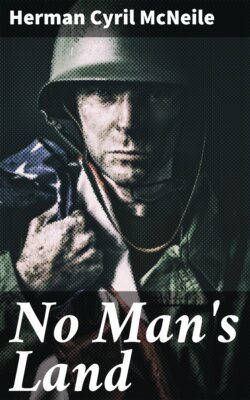Читать книгу No Man's Land - Herman Cyril McNeile - Страница 7
На сайте Литреса книга снята с продажи.
IV
ОглавлениеTable of Contents
Half an hour later he encountered Monsieur le Colonel once again, and suggested that they should split a bottle of wine together if he could spare the time. It was then nine o’clock, and the three hours till midnight loomed uninviting. His only hope, as he told him, was that the train at present standing at the platform was not going to be typical of the one he was to embark on. It seemed to be of endless length, and presented a most enticing spectacle. Four fortunates in each compartment had got the racks, otherwise the passengers stood: on the footboards, in the corridors, on the seats. If any one opened a door the pressure was such that at least six people fell on to the platform, and in one carriage a small poilu was being squeezed through the open window. In the end he went—suddenly like a cork out of a bottle, and the human mass closed up behind him.
Draycott laughed, the Colonel laughed, and went on laughing. He laughed unrestrainedly, even as a man who enjoys a secret jest. At last, with some difficulty, he controlled his mirth.
“Monsieur,” he remarked gravely, but with twinkling eyes, “I fear your hopes are ill-founded. This is the midnight train.”
“Under those circumstances,” Draycott murmured, with a ghastly attempt at mirth, “the wine is off. I must go and secure my sleeping-berth.”
Have you ever seen a fly-paper which has come “to the end of a perfect day”? Lumps of glutinous flies drop off on one’s head, and still it seems as full as ever. It was the same with that train. Lumps of Frenchmen, permanently welded together, fell out periodically, unstuck themselves, and departed, only to return in a few moments with the long thin loaves of France and bottles of wine. Sometimes they got in again, sometimes they didn’t—but they were happy, those poilus. What matter anything, bar killing the Boche? And that was the only thing in the air that night....
In every carriage it was the same, until suddenly there came salvation. A horse-box, with two horses in it and some grooms singing the Marseillaise, loomed out of the darkness, and into it the fed-up wanderer hurled his bag. Yet again did he embrace every one, including the horses; and then, overcome with his labours, he sank into a corner and laughed. And it was only when they had been under way for two hours that he remembered his two other bags, sitting alone and forlorn at the Gare de Lyon....
It was a great journey that. The heat was sweltering, and they stopped at every station between Paris and Marseilles—generally twice, because the train was too long for the platform. And at every station the same programme was repeated. Completely regardless of the infuriated whistles and toots of the French conductors, absolutely unmindful of the agonised shouts of “En voiture, en voiture! Montez, messieurs, le train part,” the human freight unloaded itself and made merry. As far as they were concerned, let the train “part.” It never did, and the immediate necessity was the inner man. But it was all very nerve-racking.
At times there were forty Frenchmen in the truck, at others none. Whether they fell off or were pushed Draycott knew not: they simply occurred—periodically. One man disappeared for five hours, and then came back again; possibly he was walking to stretch his legs; there was plenty of time. But to those who travel in trains de luxe, let me recommend a journey in a cattle-truck, where, if one is lucky, one gets a front seat, and sits on the floor with legs dangling over the side; a bottle of wine in one hand, a loaf of bread in the other, and a song when the spirit is in one. No breathless rushing through space: just a gentle amble through the ripening corn, with the poppies glinting red and the purple mountains in the distance; with a three days’ growth on one’s chin and an amalgamation of engine soots and dust on one’s face that would give a dust storm off the desert points and a beating. That is the way to travel, even if the journey lasts from Sunday night to Tuesday evening, and a horse occasionally stamps on your face. And even so did Clive Draycott, Captain of “Feet,” go to the great war....
